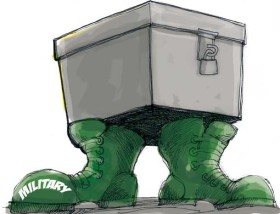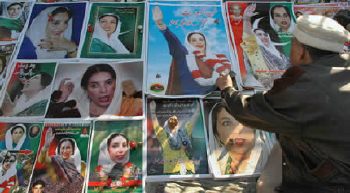Adil Najam
 Yesterday, while passing through Chicago airport on my way to Tokyo, Japan, I found myself transfixed by a wall full of posters announcing that Chicago is an “Applicant City” for the 2016 Olympics.
Yesterday, while passing through Chicago airport on my way to Tokyo, Japan, I found myself transfixed by a wall full of posters announcing that Chicago is an “Applicant City” for the 2016 Olympics.
The airport was full of them but, frankly, the posters themselves are not remarkable.
They became remarkable for me  because of the thoughts they triggered in my mind regarding Pakistan’s upcoming elections. It is, in fact, remarkable that Chicago and the rest of the world is sure that there will be Olympics held in the year 2016 (8 years or some 3000+ days from today). Not only are people sure that they would be held, people are making serious investments of time, money and effort based on the belief that they would. And, indeed, if I were to bet I would bet that they would.
because of the thoughts they triggered in my mind regarding Pakistan’s upcoming elections. It is, in fact, remarkable that Chicago and the rest of the world is sure that there will be Olympics held in the year 2016 (8 years or some 3000+ days from today). Not only are people sure that they would be held, people are making serious investments of time, money and effort based on the belief that they would. And, indeed, if I were to bet I would bet that they would.
And, then, there are these elections in Pakistan. Supposedly they are to be held in just a week. 7 days. And yet, it is not fully clear whether they would, in fact, be held on schedule. After all, there have been schedules before, but no elections (remember, we even had a poll on whether they would be held in 2007)!
Frankly, if I were to bet I would (at this point) bet that they would, indeed, be held on schedule. But the odds are still not as strong as for the 2018 Olympics.
With the ANP political rally being bombed, noises about postponements, a severe lack of trust in anything that the Musharraf government says, immense trepidation amongst the political parties, continuing clampdown on civil society, the lingering shocks of Benazir Bhutto’s assassination, and a general air of societal unease and despondent uncertainty all over the country, I am not surprised that the most common question that I have been asked by journalists recently is whether the elections will be held on time or not.
Its not just the uncertainty of whether elections will happen? Nor even what might happen in the elections, but also that of what might happen after the elections; irrespective of what the results may be. One follows the news from Kenya with a grave sense of foreboding these days. A sense of nervousness borne out of unbearable uncertainty.
![]()
 I am not surprised, but I am annoyed. But I am not annoyed at the journalists, I am annoyed at the question. At the fact that it is, in fact, a fair question. That it is a fair question is what makes it troubling. The uncertainty that this question reflects is a fact of what Pakistan has become today. A place where we cannot be certain of anything. Where you wake up every morning not knowing what might have happened overnight or could happen today.
I am not surprised, but I am annoyed. But I am not annoyed at the journalists, I am annoyed at the question. At the fact that it is, in fact, a fair question. That it is a fair question is what makes it troubling. The uncertainty that this question reflects is a fact of what Pakistan has become today. A place where we cannot be certain of anything. Where you wake up every morning not knowing what might have happened overnight or could happen today.
This uncertainly is not just uncomfortable, it is costly. I have not done the math, but no matter how you count, this uncertainty has to be expensive. How do you plan for anything? What is the cost to business of not knowing what might happen in 7 days, or even one? What is the cost to governance? To citizens? The cost of angst? The cost of anguish? The cost of just not knowing where things are heading? And most importantly, the cost of the feeling that you have little to no control over where they will head!
As I have already stated above, I think the elections are likely to be held this time. The domestic pressure and the international scrutiny is too high for them not to. I also believe that Olympics will, in fact, be held in 2018.The difference is that the first is a statement of hope; a likely probability at best. The second is a statement of certainty.
Living with such uncertainty cannot possibly be good. It cannot be good for citizens, it cannot be good for business, it cannot be good for politicians, and it certainly cannot be good for society. The tragedy of it all is that even if we have elections in 7 days, the uncertainty will not really disappear.




















































“I would like to invite you for lunch tea or anything you can possibly spare time for.”
Bijli sahib, you better be more specific. Inviting someone for anything can be misconstrued in the US, if not in Japan.
How long will u stay in Tokyo? I would like to invite you for lunch tea or anything you can possibly spare time for.
What kind of elections are we looking at where the establishment’s favorite candidate (Pervez Elahi)–trying to be the next PM of Pakistan–is almost certainly going to count on being elected on the seats won from the Punjab?! What can you say when even a ‘national leader’ like Nawaz Sharif is not supposed to win a -single seat- from Sindh?
Fellows! In 1970 there was no internet. Had there been one, then it would not have been hard to figure out that East Pakistan and West Pakistan were on different paths. Today Sindh is poised to break up if there is rigging. Heck, it is poised to breakup WITHOUT rigging unless it is nationally acknowledged that extremely popular leaders from Sindh have been killed in ‘Pindi and that Sindh has to accomodated in a genuine way. Not the way the military accomodated ZAB for 6 years after 17 Dec. 1971. Not the way the military accomodated BB in late 1988.
The irony, in case of Pakistan, is that it may not be over even after it is over.
Yogi Berra should think of something else altogether for our case.
I substantially agree with what Aqil has said; particularly, in this round of military rule, all institutions for supporting effective governance have been brutally broadsided.
Once again, it is up to the people of Pakistan and, sadly, not through the ballot box; it is a 200% certainty that it has already been rigged. They will have to battle it out on the street. The political parties can be a tremendous help by organizing for it to be done in a concerted peaceful way. Another aftermath like the one after Dec’27 may be lethal for the integrity of Pakistan.
The kind of uncertainty we constantly have is actually a proof against the myth that military rule brings more stability. A system that revolves around a single individual and does not allow for a smooth transfer of power is bound to be inherently unstable.
In the 1950s, the East Pakistanis were participating in the political system which gave them a decent chance to have their say, but when the process was blocked by the establishment, it led to the kind of polarization that eventually caused the country’s break up.
Similarly, rightly or wrongly, there was a perception in Ayub’s period that the benifits of the growth were not being distributed widely enough. This caused a reaction in the form of nationalization. However, if the elections of 1964 had not been rigged and a smooth transfer of power had been allowed, perhaps it might have spared the country from the drastic step of nationalization. The East Pakistanis might also have been satisfied with that change of power since Fatma Jinnah was widely respected there.
But alas, Ayub insisted on clinging to power untill a major movement forced him to quit later.
The lesson from our history is that dictatorship only perpetuates instability instead of bringing stability.